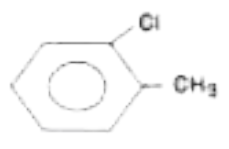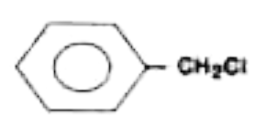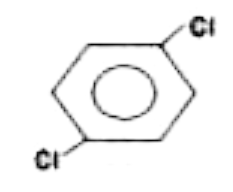Name of the following
Reaction when an alkyl halide is treated with alcoholic potassium hydroxide.
To solve the question regarding the name of the reaction when an alkyl halide is treated with alcoholic potassium hydroxide (KOH), we will follow these steps:
1. Identify the Reactants:
- The reactant is an alkyl halide. For example, we can take ethyl chloride (C2H5Cl) as a representative alkyl halide.
2. Understand the Role of Alcoholic KOH:
- Alcoholic KOH is a strong base that promotes elimination reactions. It helps in the removal of the halide (Cl in this case) and a hydrogen atom from the adjacent carbon.
3. Describe the Reaction Mechanism:
- In the presence of alcoholic KOH, the hydroxide ion (OH-) abstracts a hydrogen atom from the beta carbon (the carbon next to the one bonded to the halide), while the halide (Cl) leaves. This results in the formation of a double bond between the alpha and beta carbons.
4. Write the Reaction:
- For ethyl chloride (C2H5Cl), the reaction can be represented as:
C2H5Cl+KOH (alcoholic)→C2H4+HCl
- Here, ethene (C2H4) is formed along with hydrochloric acid (HCl).
5. Name the Reaction:
- The overall process is termed as an elimination reaction. More specifically, it is known as a dehydrohalogenation reaction because it involves the removal of a hydrogen halide (HCl in this case).
- Additionally, since the hydrogen is removed from the beta position relative to the leaving halide, it can also be referred to as a beta elimination reaction.
Final Answer:
The name of the reaction when an alkyl halide is treated with alcoholic potassium hydroxide is dehydrohalogenation reaction or beta elimination reaction.
---
- The reactant is an alkyl halide. For example, we can take ethyl chloride (C2H5Cl) as a representative alkyl halide.
- Alcoholic KOH is a strong base that promotes elimination reactions. It helps in the removal of the halide (Cl in this case) and a hydrogen atom from the adjacent carbon.
- In the presence of alcoholic KOH, the hydroxide ion (OH-) abstracts a hydrogen atom from the beta carbon (the carbon next to the one bonded to the halide), while the halide (Cl) leaves. This results in the formation of a double bond between the alpha and beta carbons.
- For ethyl chloride (C2H5Cl), the reaction can be represented as:
C2H5Cl+KOH (alcoholic)→C2H4+HCl
- Here, ethene (C2H4) is formed along with hydrochloric acid (HCl).
- The overall process is termed as an elimination reaction. More specifically, it is known as a dehydrohalogenation reaction because it involves the removal of a hydrogen halide (HCl in this case).
- Additionally, since the hydrogen is removed from the beta position relative to the leaving halide, it can also be referred to as a beta elimination reaction.
The name of the reaction when an alkyl halide is treated with alcoholic potassium hydroxide is dehydrohalogenation reaction or beta elimination reaction.
Similar Questions
Name
Reaction when an alkyl halide is treated with alcoholic potassium hydroxide.
View SolutionName the following:
i] The process by which ethane is obtained from ethene.
ii] A hydrocarbon which contributes towards the greenhouse effect
iii] The distinctive reaction that takes place when ethanol is treated with acetic acid.
iv] The property of elements by virtue of which atoms of the element can link to each other in the form of a long chain or ring structure.
v] The reaction when an alkyl halide is treated with alcoholic potassium hydroxide.
View Solution
Knowledge Check
Which of the following is an aryl alkyl halide.
A B
B C
C DNone of these
DNone of theseThe alkyl halide is converted into an alcohol by
AeliminationBdehydrohalgenationCadditionDsubstitution
Write the balanced chemical equation for the following:
Ethyl chloride treated with alcoholic potassium hydroxide.
View SolutionWhich of the following is a secondary alkyl halide ?
View SolutionName the major product obtained when an alkyl halide is treated with silver cyanide.
View SolutionWrite balanced chemical equations for the reaction: 1,2-dibromoethane is allowed to react with alcoholic potassium hydroxide.
View SolutionGive balanced equations for the following:
Ethylamine is heated with chloroform and alcoholic solution of potassium hydroxide.
View SolutionGive balanced equations for the following reactions :
Ozone is treated with potassium iodide solution.
View Solution
